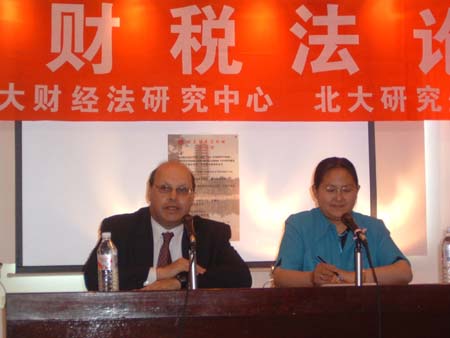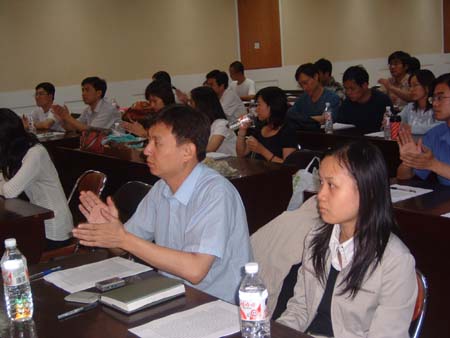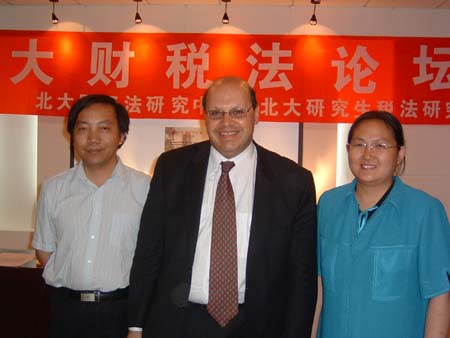2004年6月16日晚,北京大学财经法研究中心、北京大学研究生税法研究会在北京大学法学楼模拟法庭举办了第16期“北大财税法论坛”。本次论坛的主题发言人是密歇根大学法学院教授Reuven S. Avi-Yonah。Avi教授是美国著名税法学家,他这次的演讲题目为:“GLOBALIZATION AND TAX COMPETITION: IMPLICATIONS FOR DEVELOPING COUNTRIES”(全球化与税收竞争:对发展中国家的启示)。
Avi教授指出在全球化的背景下,资本流动性的增强使得各主权国家以降低税率增加投资机会,从而引发了税收竞争。他分析了税收竞争对于发达国家和发展中国家的诸如预算赤字等弊端,提出了相关的对策,如OECD和WTO即是一种很好的实践。他最后指出,在全球化背景下,无论从实践还是规则的角度,政府都应当限制税收竞争以切断中间环节,从而使得作为一个民主政府能够提供必要的公共服务。Avi教授的讲座深入浅出、生动形象,博得听众的阵阵掌声。 刘剑文教授主持论坛
刘剑文教授主持论坛
论坛的最后,北京大学财经法研究中心主任刘剑文教授做了总结发言,他指出,Avi教授对于税收竞争的研究突破了传统国际税法中的避免双重征税和避税反避税这两大课题,同时Avi教授教授以全球化为背景,从发展中国家角度思考税收竞争带来的一系列问题,在方法论上将税法、竞争法与国际税法有机结合在一起,这些创新之处都是值得学习和借鉴的。刘教授指出,限制税收竞争目前在中国突出地表现为不合理的税收优惠,因此两法合并实际上也是我国政府在衡量财力的同时对市场经济要求公平竞争环境的一种回应。
参加本次论坛的既有北大财税法方向的硕士、博士研究生,也有兄弟院校对财税法感兴趣的同学,来自国家税务总局的几位学者和官员也参与了论坛。参与论坛的学者积极参与讨论,提出了若干理论和实践紧密结合的问题与Avi教授生进行研讨,而Avi教授对所提问题给予了精彩的回答。
International Tax Competition and the Taxation of Capital
From its beginnings late in the 19th century, the modern state has been financed primarily by progressive income taxation. The income tax differs from other forms of taxation (such as consumption or social security taxes) in that in theory it includes income from capital in the tax base, even if it is saved and not consumed. Because the rich save more than the poor, a tax that includes income from capital in its base is more progressive (taxes the rich more heavily) than a tax that excludes income from capital (e.g., a consumption tax or a payroll tax). However, the ability to tax saved income from capital (i.e., income not vulnerable to consumption taxes) is impaired if the capital can be shifted overseas to jurisdictions where it escapes taxation. avi教授在发言
avi教授在发言
Two recent developments have dramatically augmented the ability of both individuals and corporations to earn income overseas free of income taxation: The effective end of withholding taxation by developed countries, and the rise of production tax havens in developing countries (Avi-Yonah 2000). Since the U.S. abolished its withholding tax on interest paid to foreigners in 1984, no major capital importing country has been able to impose such a tax for fear of driving mobile capital elsewhere (or increasing the cost of capital for domestic borrowers, including the government itself). (Tanzi, 1995; Gardner, 1992). The result is that individuals can generally earn investment income free of host country taxation in any of the world’s major economies (Avi-Yonah and Swartz, 1997; Cohen, 1998; May, 1996). Moreover, even developed countries find it exceedingly difficult to effectively collect the tax on the foreign income of their individual residents in the absence of withholding taxes imposed by host countries, because the investments can be made through tax havens with strong bank secrecy laws (Tanzi, 1995). Developing countries, with much weaker tax administrations, find this task almost impossible. Thus, cross-border investment income can largely be earned free of either host or home country taxation (Kant, 1996; McLure, 1989).
For example, consider a wealthy Mexican who wishes to earn tax-free interest income from investing in the bonds of an American corporation. All he needs to do is set up, for a nominal fee, a Cayman Islands corporation to hold the bonds. The interest payments are then made to the Caymans corporation without any U.S. tax withheld under the so-called "portfolio interest exemption." (Internal Revenue Code section 871(h)). The individual does not report the income to the Mexican tax authorities, and they have no way of knowing that the Caymans corporation is effectively an "incorporated pocketbook" of the Mexican resident. Nor are the exchange of information provisions of the U.S.-Mexico tax treaty of any help, because the IRS has no way of knowing that the recipient of the interest payments is controlled by a Mexican resident and therefore cannot report this to the Mexican authorities. As a result, the income is earned completely free of tax (the Caymans, of course, impose no income taxes of their own).
When we switch our attention from passive to productive investment, a similar threat to the taxing capacity of both home and host jurisdictions emerges. In the last decade, competition for inbound investment has led an increasing number of countries (103, as of 1998) to offer tax holidays specifically geared to foreign corporate investors (Vernon, 1998; United Nations, 1996). Given the relative ease with which an integrated multinational can shift production facilities in response to tax rates, such “production tax havens” enable multinationals to derive most of their income abroad free of host country taxation (Hines and Rice, 1994; Altshuler & Newlon, 1993). Moreover, most developed countries (including the U.S.) do not dare impose current taxation (or sometimes any taxation) on the foreign source business income of their resident multinationals, for fear of reducing the competitiveness of those multinationals against multinationals of other countries (Peroni, 1997). If they did, new multinationals could be set up as residents of jurisdictions that do not tax such foreign source income (Hines, 1991). Thus, business income can also be earned abroad largely free of either host or home country taxation.
For example: Intel Corporation, a top 10 multinational, has operations in more than 30 countries around the globe. The company states that “[a]n Intel chip developed at a design center in Oregon, might be manufactured at a wafer fabrication facility in Ireland, packaged and tested in Malaysia, and then sold to a customer in Australia. Another chip might be designed in Japan, fabricated in Israel, packaged and tested in Arizona, and sold in China.” (Intel, 1998) Specifically, outside the United States, Intel has major manufacturing facilities in Puerto Rico, China, Malaysia, the Philippines, Ireland, and Israel (Intel, 1999). Thus, outside the United States, all of Intel’s manufacturing facilities are located in countries granting tax holidays. Nor does Intel pay current U.S. tax on its income from those foreign operations, because under U.S. law, active income earned by foreign subsidiaries of U.S. multinationals is not taxed until it is repatriated in the form of dividends, which Intel can delay for many years (Avi-Yonah, 1997). Thus, the effective tax rate on Intel's foreign source income is far below the nominal U.S. corporate rate of 35%.
If income from capital can escape the income tax net, the tax becomes in effect a tax on labor. Several empirical studies have in fact suggested that in some developed jurisdictions the effective tax rate on income from capital approaches zero, and tax rates on capital have tended to go down sharply since the early 1980s (when exchange controls were relaxed) (Owens and Sasseville, 1997; Rodrik, 1997). As a result, countries that used to rely on the revenues from the income tax are forced to increase relatively regressive taxes. The two fastest growing taxes in OECD member countries in recent years have been consumption taxes (from 12% of total revenues in 1965 to 18% in 1995) and payroll taxes (from 19% to 27%), both of which are more regressive than the income tax (Owens and Sasseville, 1997). Over the same period, the personal and corporate income taxes have not grown as a percentage of total revenues (the personal income tax accounted for 26% of total revenues in 1965 and 27% in 1995, while the figures for the corporate income tax are 9% and 8% respectively) (Owens and Sasseville, 1997). The total tax revenue as a percentage of GDP in developed countries went up sharply during the same period (from an average of 28% in 1965 to almost 40% in 1994), and this increase is largely accounted for by the rise of consumption and payroll taxes (World Bank, 1994). Moreover, there is evidence that as the degree of openness of an economy in OECD member countries increases, taxes on capital tend to go down while taxes on labor go up (the income tax is imposed on both capital and labor, so that its stability may mask this trend) (Mendoza, Razin and Tesar, 1994; Mendoza et al., 1996).
The same trends can be observed in developing countries as well. In non-OECD member countries (outside the Middle East) total government revenues as a share of GDP rose from an average of 18.8% in 1975-80 to 20.1% in 1986-92 (World Bank, 1994). This growth was financed primarily by the growth of revenues from the VAT in the same period (from 25.5% of total revenues to 31.8%). At the same time, revenues from both the individual and the corporate income tax were flat or declined (World Bank, 1994).
Tax Competition and the Developing Countries
The drawbacks of tax competition for developed countries are relatively clear, because such countries have an elaborate social insurance safety net that requires a high level of government expenditure and that is threatened by tax competition (Leibfritz et al., 1995). But how does tax competition affect developing countries?
First, it should be pointed out that developing countries need the revenues at least as much as developed countries do, if not more. A common misperception is that only OECD member countries are confronted by a fiscal crisis as a result of the increasing numbers of elderly people in the population. In fact, the increase in dependency ratios (the ratio of the elderly to the working population) is expected to take place in other geographic areas as well, as fertility rates go down and health care improves (World Bank, 1994). Outside the OECD and the transition economies, the dependency ratio starts in the single digits in the 1990s, but rises to just below 30% by 2100 (McLure, 1996). Moreover, while outside the OECD and the transition economies direct spending on social insurance is much lower, other forms of government spending (e.g., government employment) effectively fulfill a social insurance role. In Latin America, for example, direct government spending on social insurance is much lower than indirect spending through government employment and procurement programs (Subbarao et al., 1997). 台下掌声不断
台下掌声不断
Moreover, it seems strange to argue that developing countries need tax revenues less than developed countries because they have less developed social insurance programs. If one accepts the normative case for social insurance, it applies to developing countries with even greater force because of widespread poverty, which means that losing a job can have much direr consequences (United Nations, 1997). But the need for revenues in developing countries goes far beyond social insurance. In some developing countries revenues are needed to insure the very survival of organized government, as the Russian experience demonstrates (Economist, 1998). In other, more stable developing countries revenues are needed primarily to provide for adequate education (investment in human capital), which many regard as the key to promoting development (Sen, 1997). For example, the UN has estimated that for only $30-$40 billion, all people in the world can obtain basic social services (such as elementary education) (United Nations, 1997). Given current trends in foreign aid, most of these funds have to come from developing country governments (United Nations, 2001).
Second, the standard advice by economists to small open economies is that they should refrain from taxing foreign investors, because such investors cannot be made to bear the burden of any tax imposed by the capital importing country (Razin and Sadka, 1991). Therefore, the tax will necessarily be shifted to less mobile factors in the host country, such as labor and/or land, and it is more efficient to tax those factors directly. But while this argument seems quite valid as applied to portfolio investment, it seems less valid in regard to FDI, for two reasons. First, the standard advice does not apply if a foreign tax credit is available in the home country of the investor, which frequently would be the case for FDI (Viherkentta, 1991). Second, the standard advice assumes that the host country is small. However, an extensive literature on multinationals suggests that typically they exist in order to earn economic rents (Hennart, 1991). In that case, the host country is no longer "small" in the economic sense. That is, there is a reason for the investor to be there and not elsewhere. Therefore, any tax imposed on such rents (as long as it is below 100%) will not necessarily drive the investor to leave even if it is unable to shift the burden of the tax to labor or landowners.
This argument clearly holds in the case of rents that are linked to a specific location, such as natural resources or a large market. But what if the rent can be earned in a large number of potential locations (Dunning, 1988)? In this case, the host country will not be able to tax the rent if the multinational can credibly threaten to go elsewhere, although once the investment has been made the rent can be taxed. This situation, which is probably the most common (Hennart, 1991), would require coordinated action to enable all host countries to tax the rent earned within their borders. Some possibilities for such action are described below.
This relates to the final argument, which is that host countries need to offer tax incentives to be competitive. An extensive literature has demonstrated that taxes do in fact play a crucial role in determining investment location decisions (Bond, 1981; Boskin and Gale, 1987; Hines, 1999). But all of these studies emphasize that the tax incentives are crucial given the availability of such incentives elsewhere (Guisinger et al., 1985). Thus, it can be argued that given the need for tax revenues, developing countries would in general prefer to refrain from granting tax incentives, if only they could be assured that no other developing country would be able to grant such incentives (Avi-Yonah, 2000).
Thus, restricting the ability of developing countries to compete in granting tax incentives does not truly restrict their autonomy or counter their interests. That is the case whenever they grant the incentive only for fear of competition from other developing countries, and would not have granted it but for such fear. Whenever competition from other countries drives the tax incentive, eliminating the competition does not hurt the developing country, and may aid its revenue raising efforts (assuming it can attract investment on other grounds, which is typically the case). Moreover, under the proposals described below, developing countries remain free to lower their tax rates generally (as opposed to granting specific tax relief aimed at foreign investors).
Two additional points need to be made from a developing country perspective. The first concerns the question of tax incidence. Since the tax competition that is most relevant to developing countries concerns the corporate income tax, it is important to attempt to assess the incidence of that tax in evaluating the effects of collecting it on the welfare of the developing country. Unfortunately, after decades of analysis, no consensus exists on the incidence of the corporate tax. While the older studies have tended to conclude that the tax is borne by shareholders or by all capital providers, more recent studies have suggested that the tax is borne to a significant extent by consumers or by labor (Pechman 1987, US Treasury 1992). Another possibility is that the tax on established corporations was borne by those who were shareholders at the time the tax was imposed or increased, because thereafter it is capitalized into the price of the shares (Pechman 1987). It is unlikely that this debate will be decided any time soon (in fact, the incidence may be shifting over time, especially as globalization may enable corporations to shift more of the tax burden to labor). However, from the perspective of a developing country deciding whether to collect taxes from a multinational, three out of the four possible alternatives for incidence (current shareholders or capital providers, old shareholders, and consumers) are largely the residents of other jurisdictions, and therefore from a national welfare perspective the developing country gains by collecting the tax. And even if some of the tax is shifted to labor in the developing country, it can be argued that as a matter of tax administration it is more efficient (as well as more politically acceptable) to collect the tax from the multinational than to attempt to collect it from the workers.
Finally, it should be noted that a developing country may want to collect taxes from multinationals even if in general it believes that the private sector is more efficient is using the resources than the public sector. That is because in the case of a foreign multinational, the taxes that the developing country fails to collect may indeed be used by the private sector, but in another jurisdiction, and therefore not benefit the developing country. One possible solution, which is in fact employed by developing countries, is to refrain from taxing multinationals while they re-invest domestically, but tax them upon remittance of the profits abroad. However, such taxation of dividends and other forms of remittance is subject to the same tax competition problem that we discussed above. Thus, it would appear that overcoming the tax competition problem is in most cases in the interest of developing countries, and the question remains how to do so in the face of the collective action problem described above.
What Can Be Done About Tax Competition?
The tax competition problem is thus essentially a problem of coordination and trust. Each jurisdiction would prefer to tax investors from abroad to gain the revenue, but is afraid that by doing so it would drive the investors to other jurisdictions that do not tax them. If there was a way to coordinate actions among the relevant jurisdictions, they all could gain added revenues without running the risk of losing the investment.
A good illustration of how this dynamic works is the history of German taxation of interest income. In 1988, Germany introduced a 10% withholding tax on interest paid to bank depositors, but had to abolish it within a few months because of the magnitude of capital flight to Luxembourg. In 1991, the German Federal Constitutional Court held that withholding taxes on wages but not on interest violated the constitutional right to equality. The government thereupon reintroduced the withholding tax on interest, but made in inapplicable to non-residents (Muten, 1994). Non-residents may, however, be Germans investing through Luxembourg bank accounts. To cope with this problem, the Germans have led an EU effort to introduce a 20% withholding tax on all interest payments to EU residents (European Union, 1998). However, both Luxembourg and the United Kingdom have so far blocked the adoption of this plan, arguing that it will lead to a flight of investors to Switzerland or the United States (Annells, 1998). avi教授在回答问题
avi教授在回答问题
Thus, the key to finding a solution to the tax competition problem is to attack it on a broad multilateral basis, through an organization such as the OECD. Under current conditions, the OECD is the natural choice for leading such coordinated actions against tax competition, for three reasons. First, for individual investors to earn decent returns on their capital without incurring excessive risks, they need to invest in an OECD member country. Tax havens do not offer adequate investment opportunities, and developing countries are generally considered too risky for portfolio investment (other than through mutual funds, which do not offer tax avoidance opportunities). Thus, if all OECD members enforced taxation of portfolio investment, it could be subject to tax without requiring cooperation from the tax havens.
Second, about 85% of the world's multinationals are headquartered in OECD member countries. This is likely to continue to be the case for a while, because OECD members offer stable corporate and securities law protection to investors that is lacking in other countries. Thus, if all OECD members agreed on a coordinated basis to tax their multinationals currently on their income from abroad, most of the problem of tax competition from direct investment could be solved.
Third, the OECD has the required expertise (its model tax treaty is the global standard) and has already started on the path of limiting tax competition. In 1998, it adopted a report entitled "Harmful Tax Competition: An Emerging Global Issue." (OECD, 1998). This report is somewhat limited, because it only addresses tax competition for financial activities and services (as opposed to, e.g., Intel's manufacturing plants). It also does not address the taxation of investment income. But it represents an extremely useful first step, and proof that a consensus can be reached on the tax competition issue (Switzerland and Luxembourg abstained, but did not dare veto the adoption of the report by the other 27 members of the OECD). 会后合影
会后合影
The OECD makes a useful distinction between tax competition in the form of generally applicable lower tax rates, and tax regimes designed to attract foreign investors. This distinction is both normatively and pragmatically sound: Restricting tax competition should not and cannot mean that voters in democratic countries lose their right to determine the size of the public sector through general tax increases or reductions. But it does mean that countries should not provide windfalls for foreign investors at the expense of the ability of other countries to provide those public services their residents desire. Such limitations are particularly appropriate because those foreign investors themselves often reside in countries providing a high level of services, and yet refuse to pay the tax price that providing such services entails.
Depending on the OECD for solving the tax competition problem suffers from one major drawback: Developing countries are left out, and may perceive actions by the OECD as a cartel of rich countries operating at their expense. In fact, as pointed out above, it is unlikely that tax competition benefits developing countries, who can also use the tax revenues they give up to attract foreign investors. If all developing countries could be prevented from competing in this fashion, they all could gain. But in the longer run, it may be better to entrust the fight against harmful tax competition to the WTO, in which developing countries are adequately represented. This would also solve the problem of what to do about the 15% of multinationals who are not headquartered in OECD member countries (a percentage that can be expected to grow if the OECD indeed moves to restrict tax competition for its multinationals).



